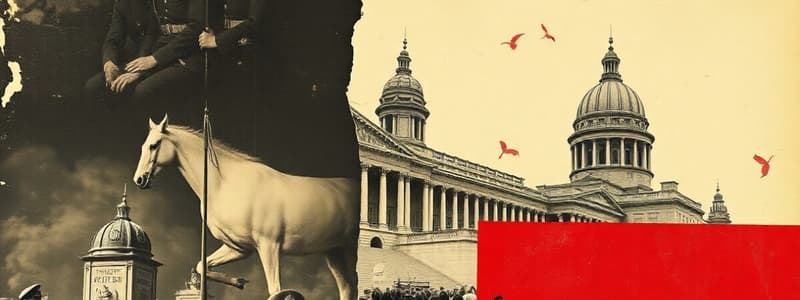Podcast
Questions and Answers
Care dintre următoarele afirmații describe cel mai bine influența monarhului prusac în cadrul Imperiului German?
Care dintre următoarele afirmații describe cel mai bine influența monarhului prusac în cadrul Imperiului German?
- Monarhul prusac avea o influență semnificativă asupra guvernului federal. (correct)
- Monarhul prusac era doar un simbol decorativ fără putere reală.
- Monarhul prusac nu avea putere asupra guvernului federal.
- Monarhul prusac împărtășea puterea în mod egal cu Reichstag.
Care a fost un motiv principal pentru extinderea militară a Germaniei sub conducerea lui Otto von Bismarck?
Care a fost un motiv principal pentru extinderea militară a Germaniei sub conducerea lui Otto von Bismarck?
- Pentru a se alătura organizațiilor internaționale.
- Pentru a reduce cheltuielile guvernamentale.
- Pentru a asigura securitatea națională și prestigiul. (correct)
- Pentru a promova pacea și stabilitatea în Europa.
Ce rol a jucat industrializarea în dezvoltările culturale din Germania?
Ce rol a jucat industrializarea în dezvoltările culturale din Germania?
- A dus la stagnarea artei și literaturii.
- A contribuit la transformările culturale și la diversificarea mișcărilor artistice. (correct)
- A limitat accesul la educație.
- A creat o uniformitate culturală prin restricții.
Ce strategie diplomatică a folosit Bismarck pentru a preveni izolația Germaniei în Europa?
Ce strategie diplomatică a folosit Bismarck pentru a preveni izolația Germaniei în Europa?
Care dintre următoarele afirmații referitoare la participarea politică în Imperiul German este corectă?
Care dintre următoarele afirmații referitoare la participarea politică în Imperiul German este corectă?
Flashcards
Imperiul German
Imperiul German
Stat federal format din 25 de state (regate, ducate, principate, orașe libere) în 1871.
Expansiunea militară germană
Expansiunea militară germană
Construcție militară substanțială în Germania, bazată pe serviciul militar obligatoriu, și pe dezvoltarea infrastructurii militare.
Diplomația lui Bismarck
Diplomația lui Bismarck
Diplomație complexă, menită să mențină echilibrul de putere european și să izoleze Franța.
Parlamentul German (Reichstag)
Parlamentul German (Reichstag)
Signup and view all the flashcards
Faptele politice ale Germaniei
Faptele politice ale Germaniei
Signup and view all the flashcards
Study Notes
Political Structure
- The German Empire, established in 1871, was a federal state comprising 25 states (kingdoms, grand duchies, duchies, principalities, and free cities).
- The Prussian monarch held the position of German Emperor, wielding significant influence over the federal government.
- The Reichstag (parliament) was responsible for legislation, although the Bundesrat (federal council) heavily influenced the legislative process.
- A complex system of power-sharing existed between the central government and the individual states.
- Significant political factions and parties (conservatives, liberals, socialists) shaped the political landscape.
- Political participation was not universal, with limitations on voting rights for certain demographics.
Military Expansion
- Germany pursued a significant military build-up under the guidance of Chancellor Otto von Bismarck and successive leaders.
- The development of a large and powerful army based on conscription was fundamental to German strategy.
- Military expansion was often justified as essential for national security and prestige.
- Expansion in military infrastructure (e.g., fortifications, naval bases) was also a prominent feature.
- The rise of a powerful navy, initially influenced by the British model, sought to project German power globally.
Cultural Developments
- Industrialization fueled cultural transformations, impacting literature, arts, music, and philosophy.
- The rise of diverse artistic and intellectual movements (e.g., Expressionism, Impressionism) reflected the complex cultural landscape.
- German cultural identity was often intertwined with national aspirations and perceived superiority.
- Growth of various cultural institutions like universities, libraries, and theatres played a significant role.
- Public education was viewed as a crucial element of national development.
Diplomatic Relations
- Initially, Otto von Bismarck aimed to maintain a balance of power in Europe through complex alliances.
- Germany's aim was to avoid isolation and to contain potential threats from other European powers.
- Bismarck's diplomacy focused on isolating France and preventing the formation of coalitions against Germany.
- Increasingly, international tensions rose, and Germany became a dominant force in European political rivalries.
- Agreements and treaties played a crucial role in European power politics.
- Shift from diplomatic alliances to a more aggressive foreign policy emerged over time.
- Germany's stance often alienated other European nations, contributing to rising tensions leading up to WWI.
Studying That Suits You
Use AI to generate personalized quizzes and flashcards to suit your learning preferences.




